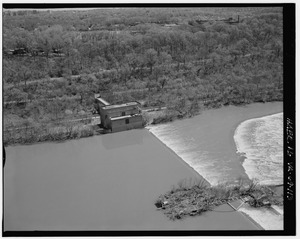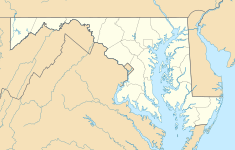Little Falls Dam (Potomac River) facts for kids
Quick facts for kids Little Falls Dam |
|
|---|---|
 |
|
|
Location of Little Falls Dam
|
|
| Country | United States |
| Coordinates | 38°56′54.03″N 77°07′46.73″W / 38.9483417°N 77.1296472°W |
| Status | Operational |
| Opening date | 1959 |
| Owner(s) | U.S. Army Corps of Engineers |
| Dam and spillways | |
| Type of dam | Concrete gravity |
| Impounds | Potomac River |
| Height | 14 ft (4.3 m) |
| Length | 1,500 feet (460 m) |
| Spillway type | Uncontrolled overflow |
The Little Falls Dam, also known as Brookmont Dam, is a low dam on the Potomac River. It was built in 1959 to help supply water to Washington, D.C.. The dam is located just below Mather Gorge, about 2 miles (3.2 km) upstream from Chain Bridge.
Why the Dam Was Built
The Little Falls Dam is very important for the water supply of Washington, D.C. It helps to direct water from the Potomac River into the Washington Aqueduct. This aqueduct is a system that carries drinking water to the city.
The dam provides about 15 to 20 percent of the water that Washington, D.C. uses. During times when there is not much rain, like a drought, the dam can supply up to 30 percent of the city's water. The U.S. Army Corps of Engineers built this 14-foot (4.3 m) tall dam. They are also in charge of making sure Washington, D.C. has enough water.
Safety and Changes
The Little Falls Dam has a strong water flow at its base. Because of this, it has sometimes been called "the drowning machine." This name came about because the powerful currents could trap boaters and swimmers.
To make the area safer, the dam was changed in 2000. These changes helped to reduce the chances of people getting trapped under the water. The shape of the dam's base was altered to create a safer flow.
Helping Fish Migration
Dams can sometimes block the paths of fish that need to swim upstream to lay their eggs. The Little Falls Dam is located several miles below the Great Falls of the Potomac River. The Great Falls is a natural barrier where fish migration would normally end.
Because the dam blocked these fish routes, changes were made in 2000. These improvements helped fish to pass the dam more easily. This allows them to continue their natural journeys up the river.
 | Charles R. Drew |
 | Benjamin Banneker |
 | Jane C. Wright |
 | Roger Arliner Young |


